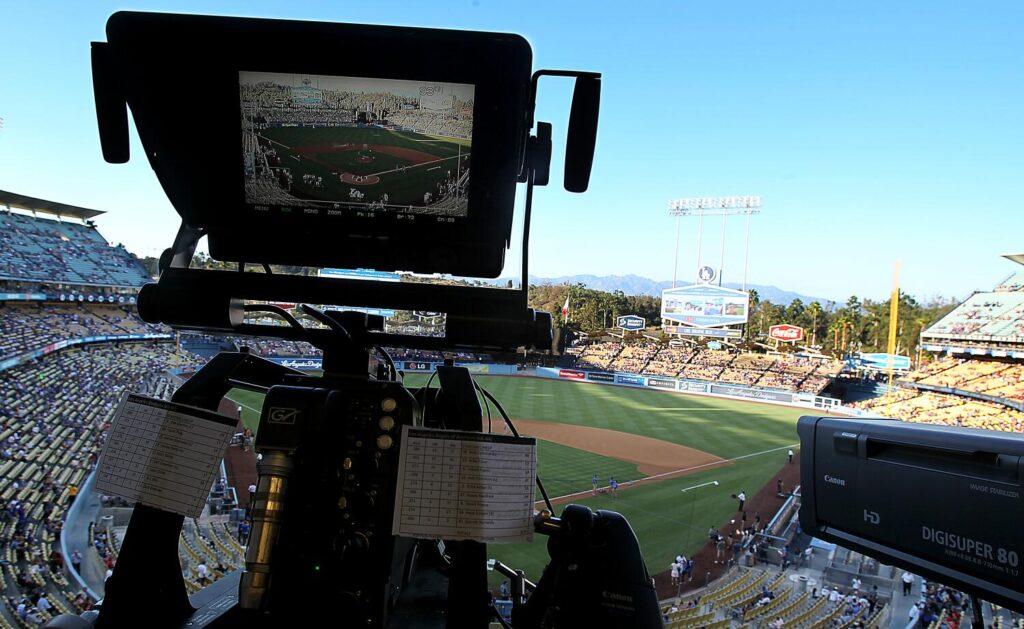You are a Dodgers fan. You would happily pay to stream Dodgers games from SportsNet LA, but you do not want to buy a cable or satellite subscription.
You could not do that last year. You can do that this year — but not without paying the company that operates SportsNet LA for separate services you might not want or need.
With the Dodgers about to open a highly anticipated season — the team is a World Series favorite and could set a franchise attendance record, with excitement stirred largely by the billion-dollar signings of Japanese-born stars Shohei Ohtani and Yoshinobu Yamamoto — Spectrum announced Tuesday that streaming subscriptions would be available for SportsNet LA this year.
The price: Free.
The catch: You no longer need to buy television service from Spectrum. If you do not, however, you must buy Internet and mobile telephone service from Spectrum. The SportsNet LA streaming service will be up and running for the Dodgers’ opener Wednesday.
Spectrum last October launched a streaming option for Spectrum SportsNet — its Lakers channel — but any fan in the Los Angeles market can subscribe, without buying anything else, for $19.99 per month or $149.99 per season.
For the Dodgers, Spectrum will throw in SportsNet LA streaming free to any fan in the Los Angeles market who buys its Internet and mobile telephone service, offered as of Tuesday at a promotional price of $49.99 per month.
The SportsNet LA streaming agreement covers only the 2024 season. A single streaming subscription that combined the Dodgers and Lakers could have been complicated by the different ownership structures and distribution deals of the Dodgers and Lakers channels, but Spectrum also gets a real-life test to see whether fans might respond more favorably to a streaming-only option or a broadband-telephone-streaming bundle.
“In the evolving TV landscape, we are examining different approaches to making our regional sports networks available to fans while maximizing value for our customers,” Spectrum spokesman Bret Picciolo said.
Major League Baseball and its teams are navigating turbulent times. As the cable and satellite audience continues to shrink, so does the reliance on lucrative contracts in which all pay-TV subscribers paid their local team even if they never watched a single game.
The issue for Spectrum echoes throughout the cable and satellite industry: how to manage the decline of a traditionally lucrative subscriber base while positioning itself for a streaming future. Some small cable companies across the country have cited increased programming costs in pulling the plug on television entirely and limiting offerings to broadband and telephone service.
Spectrum previously made SportsNet LA streaming available only to its television subscribers, as a benefit of the subscription. That benefit remains available.
The parent company of Bally Sports — the home of the Angels and 11 other MLB teams — has been in bankruptcy proceedings for more than a year.
Bally has streaming rights to five of those teams. The Angels are not one of them; Bally Sports West sells streaming subscriptions only for the Clippers, Ducks and Kings, bundled together at $29.99 per month.
The San Diego Padres are one of three former Bally teams for which MLB now handles broadcasts. The Padres and the league have not yet announced cable or satellite options for San Diego this season, but streaming-only Padres subscriptions are on sale for $19.99 per month or $199.99 per year.
YES, the television home of the New York Yankees and the NBA’s Brooklyn Nets, currently offers streaming subscriptions at an introductory price of $19.99 per month or $199.99 per year.
NESN, the home of the Red Sox and the NHL’s Boston Bruins, sells streaming subscriptions at $29.99 per month or $329.99 per year.
The significant disparity in how much money each team makes in annual local television revenue — the Dodgers make about five times as much as the Padres, for instance — has spurred MLB commissioner Rob Manfred to push for each team to contribute its streaming rights toward a national package in which any fan could stream any game from anywhere, without the blackout restrictions that have long protected cable and satellite companies.
“There is a realization in the industry that, in order for this business to be all it can be, we need to undertake an effort to get as close to the model you are talking about as possible,” Manfred told The Times in 2022.
It is uncertain whether the league can acquire all those rights, let alone come to an economic deal in which large-market teams like the Dodgers and Yankees would agree to sacrifice significant broadcast revenue for the greater good.
But, in that interview two years ago, Manfred was asked if developing and rolling out that model would be a five-year or 10-year project.
“It will not be a 10,” he said then. “It is going to happen sooner than that.”

